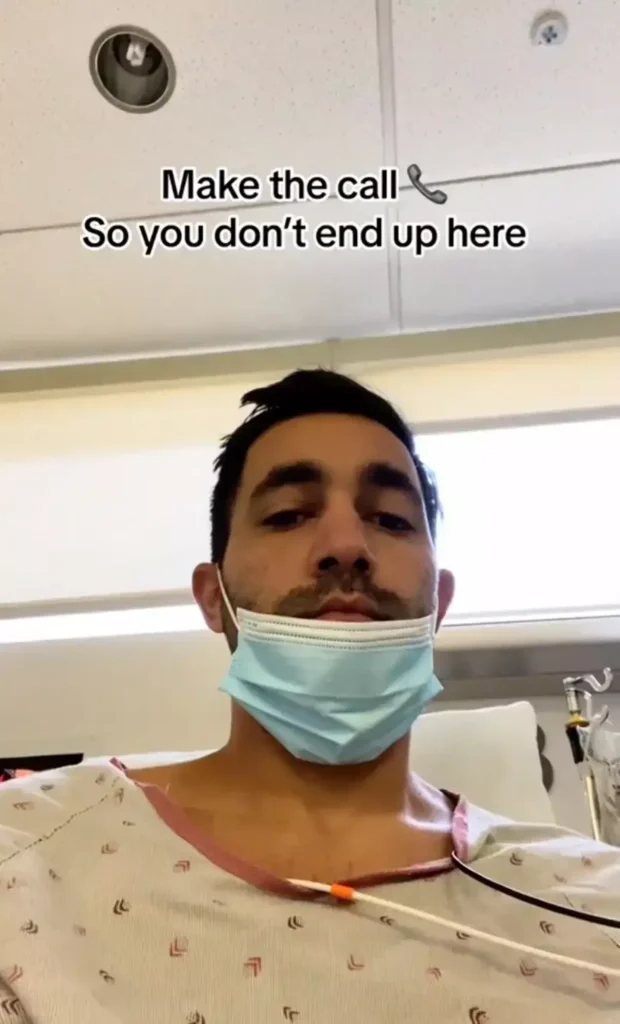A guy who received a stage 4 colorectal cancer diagnosis has opened up about the warning signs he saw before learning of his illness.
Joe Faratzis described the signs that he was dealing with a serious disease, acknowledging that he had “put these symptoms off for months.”
He disclosed on TikTok that he disregarded the warning signs and ultimately decided to undergo a colonoscopy for further information.

He is now telling people that “early screening could save you and your family” and that they shouldn’t “risk your life by waiting to see a doctor.”
He revealed that his symptoms started in 2019 and that he was diagnosed five years ago at the age of 28.
The TMZ producer acknowledged that he dismissed his doctor’s worries and a CT scan because, at the time, he thought the symptoms weren’t serious.
According to Self Magazine, he held the belief that he was invincible. That is, until he was unable to ignore the symptoms any longer and decided to share them in order to raise awareness among those who might be disregarding concerning symptoms as well.
Sweating and night sweats
Cathy Eng, MD, Professor of Medicine at Vanderbilt University Medical Center, told Patient Power that “night sweats, weight loss, pain, chronic anemia, fatigue, shortness of breath, and loss of energy” are all signs of advanced colon cancer.

This indicates that the cancer has either spread or reached a stage where treatment is more challenging.
Lower right abdominal pain
Healthline states that the location of cancer on your colon can be determined by the place where you experience pain.

For instance, the ascending colon, or “the first part of your colon that attaches to your small intestine,” is located in the lower right side. It raises the stool.
Frequent trips to the bathroom
“One thing that I should have paid more attention to is just noticing that I was going to the bathroom way more often than I should have, probably like a couple times a day,” he said.
Abdominal cramps when bending over
He disclosed that he felt agony every time he leaned over, but he dismissed his CT scan and believed it to be a minor ailment.

(function(w,q){w[q]=w[q]||[];w[q].push([“_mgc.load”])})(window,”_mgq”);
Constipation and cramps

According to the MC Anderson Cancer Center, constipation and diarrhea are both obvious indicators of colorectal cancer, despite the NHS’s claim that the disease might alter your bowel habits.
Blood in stool
When he saw blood on his toilet paper six months later, he thought it was from hemorrhoids, or piles, and brushed it off.
But the main clue that something wasn’t quite right was on the horizon.
The 34-year-old shared: “The big catalyst that motivated me to take my symptoms seriously occurred a few months later. I was sitting on the couch and I passed gas, looked down, and saw blood.”
“I went to the bathroom and there was about a half cup of blood in the toilet. It wasn’t painful, but I was like, ‘Holy f–k — obviously there’s some issue here.’”
Faratzis revealed that throughout his tests, he had oral and intravenous chemotherapy, underwent surgery to remove cancerous pieces of his colon, and underwent operations to burn and freeze lesions that had formed on his liver and lungs.
Fortunately, his health started to improve when his treatments were implemented, and in 2023, he had his first clear CT scan.
He subsequently celebrated a full year of clear scans in April of this year, meaning that he can “kind of forget about this for another three months” until his next scan.
However, he shared that he could have prevented himself from being in such a dire situation, noting to himself, “If I got the CT scan back in 2019 when I had my earliest colorectal cancer symptoms, I might not have wound up in the position I’m in now.”
Since going through his battle, he has become an advocate of early detection, telling viewers: “Turns out, having a functioning rectum is actually vital for your quality of life.”



